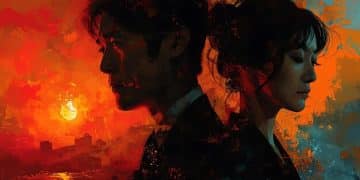Historical Fiction’s Accuracy Dilemma: Entertainment vs. Education

Exploring the historical fiction’s accuracy problem reveals a constant negotiation between engaging storytelling and trustworthy historical representation. Balancing entertainment with educational integrity stands as the genre’s central challenge, shaping reader perception and impacting cultural memory.
Historical fiction transports us to bygone eras, offering adventure, romance, and intrigue. But how much of what we read is true? **Historical Fiction’s Accuracy Problem: Balancing Entertainment with Educational Integrity** is a debate that resonates throughout the literary world. Is it acceptable to bend the truth for a more captivating narrative, or should historical accuracy always take precedence? Let’s delve into this fascinating dilemma.
Historical Fiction’s Accuracy Problem: Striking the Right Balance
Historical fiction, by its very nature, walks a tightrope. It seeks to immerse readers in the past while simultaneously entertaining them. This often requires authors to make choices about where to prioritize accuracy and where to take creative liberties. Weighing the demands of storytelling against the requirements of historical validity is tricky.
The Allure of Historical Fiction
Why do readers flock to historical fiction? It’s more than just escaping to another time. These stories offer a unique lens through which to examine universal human experiences. They also allow us to learn about different cultures and societies in an engaging way.
- Provides immersive experiences of different eras.
- Offers unique insight into historical events and figures.
- Explores timeless themes through a historical lens.
Navigating the landscape of historical fiction requires readers to critically assess narratives. Recognizing the potential for both enlightenment and misrepresentation is crucial for informed engagement with the genre.

Examining the Spectrum of Accuracy in Historical Fiction’s Accuracy Problem
Not all historical fiction is created equal. Some authors meticulously research every detail, striving for near-perfect accuracy. Others take a more freewheeling approach, prioritizing narrative drive over strict adherence to the historical record. Where does one draw the line?
The Importance of Research
Regardless of their approach to accuracy, responsible historical fiction authors conduct thorough research. This may involve studying primary sources, consulting with historians, and visiting historical sites. The depth of research can significantly impact the quality and credibility of the final product.
However, even with extensive research, some degree of fictionalization is inevitable. Authors must make choices about which details to include, which characters to focus on, and how to interpret historical events. These choices inevitably shape the narrative and influence the reader’s understanding of the past.
- Extensive research is the bedrock of responsible historical fiction.
- Authorial choices and interpretations always shape the narrative.
- Complete accuracy may be impossible to achieve.
**Historical Fiction’s Accuracy Problem: Balancing Entertainment with Educational Integrity** often forces authors to choose between verified facts and dramatic necessity.
When Does Entertainment Trump Authenticity in Historical Fiction’s Accuracy Problem?
The question of when entertainment justifies deviations from historical accuracy is a complex one. There’s no easy answer, as the “right” approach depends on the specific story, the author’s intentions, and the reader’s expectations.
One perspective is that historical fiction’s primary goal is to entertain. As long as the core historical events are not misrepresented, some artistic license is acceptable, even necessary, to create a compelling and engaging story.
Dangers of Misrepresentation
However, there are potential dangers to bending historical facts. Misrepresentations can perpetuate harmful stereotypes, distort historical narratives, and ultimately mislead readers about the past. It is important to consider who benefits and who is harmed by alterations to the historical narrative.
When considering **Historical Fiction’s Accuracy Problem: Balancing Entertainment with Educational Integrity**, one consideration is examining the use of anachronisms for dramatic effect.
- Misrepresentations can perpetuate harmful stereotypes.
- Alterations can distort an accurate version of the past.
- Audiences may be misled due to fictional devices.
Thoughtful authorial intention, especially when veering off course from established fact, can help to avoid unintentional misinformation during **Historical Fiction’s Accuracy Problem: Balancing Entertainment with Educational Integrity.**
The Reader’s Role in Navigating Historical Fiction’s Accuracy Problem
Readers also play a vital role in navigating the complexities of historical fiction. Critical thinking and media literacy are essential for discerning fact from fiction and for understanding the ways in which historical narratives can be shaped and manipulated. It’s crucial to look behind the curtain.
Engaging with Historical Fiction Critically
Readers should approach historical fiction with a healthy dose of skepticism, recognizing that it is a work of interpretation rather than a definitive historical account. This means questioning the author’s choices, comparing the narrative to other sources, and considering the potential biases at play.
By engaging with historical fiction critically, readers can gain a deeper understanding of the past while also developing their analytical skills. Being able to see through the possible distortions is a necessary skill.

Authorial Responsibility and Ethical Considerations in Historical Fiction’s Accuracy Problem
Authors bear a significant responsibility when writing historical fiction. They have the power to shape readers’ understanding of the past, and they must wield that power ethically and responsibly. This means acknowledging the limits of their knowledge, being transparent about their creative choices, and avoiding the perpetuation of harmful stereotypes or misinformation.
The Importance of Transparency
One way for authors to demonstrate their commitment to accuracy is to include author’s notes or afterwords that discuss their research process and their approach to fictionalizing historical events. This allows readers to understand the choices that were made and to assess the accuracy of the narrative for themselves.
- Transparency allows readers to follow the author’s rationale.
- Providing context is ethical and demonstrates integrity.
- Sharing the research process helps readers evaluate for themselves.
Authors should strive to avoid causing unintentional harm or inadvertently spreading misinformation about **Historical Fiction’s Accuracy Problem: Balancing Entertainment with Educational Integrity.**
The Future of Historical Fiction’s Accuracy Problem
As historical fiction continues to evolve, so too will the debate over accuracy. New technologies, such as virtual reality and interactive storytelling, offer exciting possibilities for immersing readers in the past, but they also raise new ethical challenges. How can we ensure that these immersive experiences are both engaging and accurate?
Embracing Nuance and Complexity
The future of historical fiction may lie in embracing nuance and complexity. Rather than presenting a simplistic or idealized version of the past, authors can focus on exploring the contradictions, ambiguities, and diverse perspectives that are often missing from traditional historical accounts. Exploring the past with a nuanced perspective can aid in **Historical Fiction’s Accuracy Problem: Balancing Entertainment with Educational Integrity.**
Ultimately, the goal of historical fiction should not be to provide a definitive historical account, but rather to stimulate critical thinking, foster empathy, and inspire a deeper appreciation for the richness and complexity of the human experience.
| Key Element | Brief Description |
|---|---|
| 🔑 Accuracy | The degree to which the story reflects actual historical facts. |
| 🎭 Entertainment | The story’s ability to engage, captivate, and hold the reader’s attention. |
| 🤔 Reader’s role | Critical thinking is essential for discerning fact from fiction. |
| ✍ Ethical Writing | Transparency and a commitment to avoid harmful misrepresentations aids in ethical fiction. |
Frequently Asked Questions
It refers to the challenges authors face when trying to balance the desire to tell an entertaining story with the need to accurately portray historical events and figures. Finding the compromise is imperative.
Readers love historical fiction for its ability to transport them to different times and places, allowing them to experience history in a vivid and engaging way. The stories allow a new perspective.
There is no consensus. Some purists believe authors should adhere strictly to historical facts, while others argue that some artistic license is necessary for creating a compelling narrative; the balance is complicated.
Writers have a responsibility to conduct thorough research, to be transparent about their creative choices, and to avoid perpetuating harmful stereotypes or misinformation. Readers place their trust in the author.
Readers can question the author’s choices, compare the narrative to other reliable historical sources, and consider the potential biases that might be at play. Becoming active readers is important.
Conclusion
The debate over **Historical Fiction’s Accuracy Problem: Balancing Entertainment with Educational Integrity** is as old as the genre itself. There’s no simple resolution, but awareness of the complex dynamics at play helps foster more insightful reading experiences.





